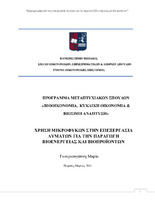Χρήση μικροφυκών στην επεξεργασία λυμάτων για την παραγωγή βίο ενέργειας και βίο προϊόντων

Προβολή/
Λέξεις κλειδιά
Μικροφύκη ; Επεξεργασία υγρών αποβλήτων ; Συμβατικές μέθοδοι ; Ενεργός ιλύς ; Βιολογική απομάκρυνση ; Διήθηση με μεμβράνες ; Μικροοργανισμοί ; Βιοαποικοδόμηση ; Βιοκαύσιμα ; Βιοντίζελ ; Μεθανογένεση ; Ζύμωση ; Βιοσύνθεση ; Ανανεώσιμες πηγές ενέργεια ; Κυκλική οικονομία ; Παραγωγή ενέργειαςΠερίληψη
Η ρύπανση των υδάτινων πόρων και η παραγωγή ενέργειας αποτελούν μείζονες περιβαλλοντικές προκλήσεις. Οι συμβατικές μέθοδοι επεξεργασίας υγρών αποβλήτων μπορούν να απομακρύνουν αποτελεσματικά πολλούς ρύπους, αλλά μπορεί να είναι δαπανηρές, ενεργοβόρες και έχουν περιορισμούς στην απομάκρυνση ορισμένων αναδυόμενων ρύπων. Τα μικροφύκη είναι μια ποικιλόμορφη ομάδα φωτοσυνθετικών μικροοργανισμών που μπορούν να αναπτυχθούν γρήγορα χρησιμοποιώντας θρεπτικά συστατικά και CO2 από υγρά απόβλητα ως πηγή ενέργειας. Μπορούν να απομακρύνουν ρύπους όπως άζωτο και φώσφορο, βαρέα μέταλλα και οργανικές ενώσεις μέσω διαφόρων μηχανισμών και να παράγουν πολύτιμα βιοπροϊόντα όπως βιοκαύσιμα, πρόσθετα τροφίμων και χημικές ουσίες υψηλής αξίας. Η χρήση μικροφυκών στην επεξεργασία υγρών αποβλήτων έχει πρόσφατα αναδειχθεί ως μια πιθανή βιώσιμη λύση που μπορεί να ξεπεράσει ορισμένους από τους περιορισμούς των συμβατικών μεθόδων. Η παρούσα μελέτη αποσκοπεί στη διερεύνηση της δυνητικής χρήσης των μικροφυκών για την επεξεργασία υγρών αποβλήτων και την παραγωγή βιοενέργειας και βιοπροϊόντων. Τα ευρήματα αυτής της μελέτης μπορούν να παράσχουν πολύτιμες γνώσεις σχετικά με τη χρήση των μικροφυκών στην επεξεργασία υγρών αποβλήτων και να συμβάλουν στην ανάπτυξη βιώσιμων λύσεων για τη ρύπανση των υδάτων, την παραγωγή ανανεώσιμης ενέργειας και την κυκλική οικονομία. Επιπλέον, η παρούσα μελέτη μπορεί να χρησιμεύσει ως βάση για μελλοντική έρευνα στον τομέα, ενημερώνοντας τους υπεύθυνους χάραξης πολιτικής και τους ενδιαφερόμενους φορείς σχετικά με τις δυνατότητες των τεχνολογιών με βάση τα μικροφύκη για την παραγωγή βιοενέργειας και βιοπροϊόντων.


